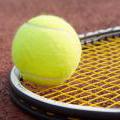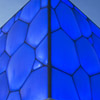-

How should you decide which leg of the 4x400 metres relay the team's fastest runner should run? This short article, aimed at older students and the general public, looks at some of the tactical choices team captains and coaches face and how randomness might help.
-

Accuracy matters when it comes to building Olympic sports venues. This short article, aimed at older students and the general public, looks at why small errors can have large consequences for record-breaking sporting performance.
-

As London is heading for the 2012 Olympics, it's not just athletes who are gearing up for action. Engineers, too, are working hard to produce the cutting-edge sporting equipment that guarantees record performances. If you're a tennis player, your most important piece of equipment is your racket. Over recent decades new materials have made tennis rackets ever bigger, lighter and more powerful. So what kind of science goes into designing new rackets?
-

One of the most impressive features of the 2008 Beijing Olympics was the beautiful aquatics venue, known as the Water Cube. Looking as if it was sliced from a giant foam of bubbles, the design was based on an unsolved maths problem. Find out more with this article, aimed at older students and the general public.
-

Travel, money, meeting new people, living in new cultures, and a whole lot of sport — that's where maths has taken Jamie Clarke, an IT project manager who specialises in international sport projects such as the 2006 Winter Olympics in Torino. In this interview, originally published on our Plus website, Jamie tells how he went from engineering to the Olympics.
Pages
- « first
- ‹ previous
- 1
- 2
- 3
- 4

